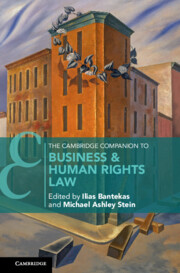| |
Pris: 1204 SEK exkl. moms  |  How can businesses operate profitably and sustainably while ensuring that they are applying human rights? It is possible to apply human rights while at the same time decreasing cost and making human rights contribute to profits. Yet business efforts alone are insufficient, and states must possess sufficient regulatory power to work together with businesses and investors – not only to improve human rights but also to foster development more broadly. This textbook, the first of its kind, explores all aspects of the links between business operations and human rights. Its twenty-five chapters guide readers systematically through all the particular features of this intersection, integrating legal and business approaches. Thematic sections cover conceptual and regulatory frameworks, remedies and dispute resolution, and practical enforcement tools. Ideal for courses in business, law, policy and international development, the book is also essential reading for managers in large corporations. How can businesses operate profitably and sustainably while ensuring that they are applying human rights? It is possible to apply human rights while at the same time decreasing cost and making human rights contribute to profits. Yet business efforts alone are insufficient, and states must possess sufficient regulatory power to work together with businesses and investors – not only to improve human rights but also to foster development more broadly. This textbook, the first of its kind, explores all aspects of the links between business operations and human rights. Its twenty-five chapters guide readers systematically through all the particular features of this intersection, integrating legal and business approaches. Thematic sections cover conceptual and regulatory frameworks, remedies and dispute resolution, and practical enforcement tools. Ideal for courses in business, law, policy and international development, the book is also essential reading for managers in large corporations.
- Interdisciplinary approach to the intersection of business and human rights
- Systematic and step-by-step approach makes complex content accessible to a wide readership
- Ideal for students, researchers and business leaders
Table of Contents
Part I. Conceptual Framework:
1. The links between business and human rights under international law and the role of non-state actors Ilias Bantekas
2. International trade and human rights Francesco Seatzu
3. Neo-liberalism, state-capitalism and European ordo-liberalism: why power politics and 'constitutional failures' undermine economic law and human rights law Ulrich Petersmann
4. Corporate governance and corporate social responsibility John Paterson
5. The role of business in international development and the attainment of the sustainable development goals Katerina Akestoridis
6. The business and economic case for human rights Dorothee Baumann-Pauly and Lilach Trabelsi
7. The business and economic case for human rights Maximilian Schormair
Part II. Regulatory Framework:
8. The UN guiding principles and its predecessors Surya Deva
9. The regulatory framework of multinational enterprises Peter Muchlinski
10. The UN global compact and the OECD guidelines on multinational enterprises and their enforcement mechanisms Andreas Rasche
11. Taxation and business with a focus on the human rights dimension of transfer pricing and other corporate tax practices Reuven Avi-Yonah
12. Corporate accountability for the natural environment and climate change Damilola Olawuyi
13. Corporate accountability for corruption and the business case for transparency Philip Nichols
14. Implementation of the convention on the rights of disabled persons by corporations Michael Ashley Stein
15. Gender, business and human rights Jessica Corsi
16. The business sector and the rights to work and just and favorable conditions of work Marija Jovanovic
17. Ethical and responsible lending to sovereigns, credit rating agencies and export credit as drivers of human rights Aline Darbellay Susso
18. Intellectual property rights and human rights Molly Land and Lea M. Nesselhauf
Part III. Remedies and Dispute Resolution:
19. Remedies (judicial and settlements) against business for breaches of human rights Richard Meeran
20. The role of human rights in foreign investment law and arbitration Silvia Karin Steininger
21. An international business and human rights tribunal Judith Levine and Sarah Castles
22. Innovative contractual remedies with indigenous peoples Kinnari Bhatt
Part IV. Practical Enforcement Tools:
23. Legal, ethical and practical dimensions of human rights impact assessments and successful case studies Ilias Bantekas
24. Drafting a corporate (sustainability) audit report Chiara Ferracioli and Julien Parkhomenko
25. The consumer case for sustainable business practices: lessons for corporations Anna Triponel
26. Effectively monitoring business global supply chains and addressing host state pressure to decrease human rights standards Tam Nguyen
27. A business and human rights treaty Ilias Bantekas. | | |
|